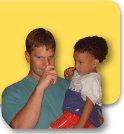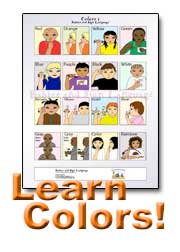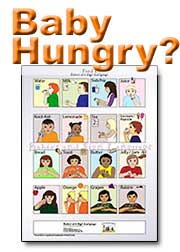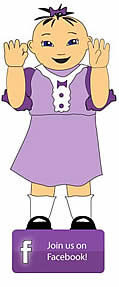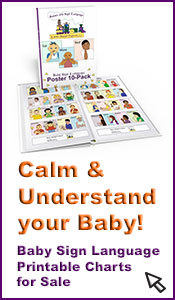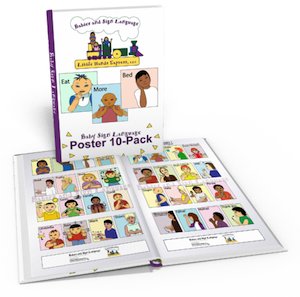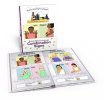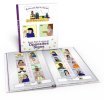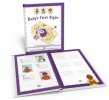Sign language of hearing babies can enhance the development of emotional intelligence (EQ).
by Jo-Marie Bothma
(South Africa, Free State)
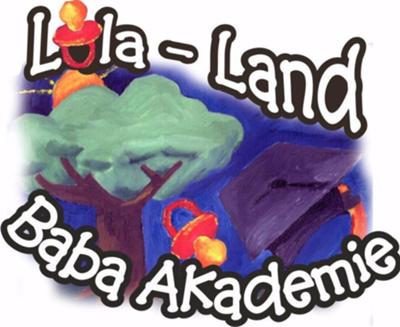
SIGN LANGUAGE WITH HEARING BABIES WILL ENHANCE THE DEVELOPMENT OF EMOTIONAL INTELLIGENCE (EQ)
Article by Jo-Marie Bothma
Clinical Psychologist & Baby Hands SA Sign Language Instructor (South Africa)
For most of the century, scientists and medical professionals explored and studied the hardware of the brain and the mind.
This however could not explain some common questions: why some just seem to have a gift to live well, why the smartest kid in the class not end up the richest, why some cope and others sink at the slightest challenge.
It appears that Emotional Intelligence (EQ) might give us answers to those types of questions. Emotional intelligence is by definition a complex, multifaceted quality.
EQ represents such intangibles as self-awareness, empathy, persistence and social deftness. EQ are used to describe qualities like the ability to identify, understand and control one’s own feelings and thoughts, empathy for the feelings of others and how to handle emotions in a way that enhances living.
A person would thus be considered emotional intelligent if he/she can communicate thoughts and feelings appropriately to others and learn to interact with adults, peers, family and friends.
If there is a cornerstone to EQ on which most other emotional skills depend, it is a sense of self-awareness, of being smart about what we feel.
Once an emotional response comes into awareness, it will be processed by the “thinking” part in the brain (neocortex) and changes of handling it appropriately improves.
For example: A person whose day starts badly at home may be grouchy all day at work… without really knowing why. The moment he can actually process the feeling and realize that he is feeling sad, anger or sorrow about what happened that morning – he can handle the situation better.
Aristotle wrote that anyone can become very angry – that is easy! “But to be angry with the right person, to the right degree, at the right time, for the right purpose, and in the right way – that is not easy!”
Emotional skills can be shaped by experience. Infants as young as 3 months old exhibit empathy when they get upset at the sound of another baby crying.
Even very young children learn by imitation; by watching how others act when they see someone in distress, these children acquire a repertoire of sensitive responses.
If, on the other hand, the feelings they begin to express are not recognized and reinforced by the adults around them, they not only cease to express those feelings but they also become less able to recognize them in themselves or others.
More and more studies show the importance of early childhood environment and the effect that it has on adult behavior.
There is reason to believe that a child’s experience of his parents is an especially potent sculptor of the parts of the brain involved in emotion, personality, and behavior.
Some studies indicate that the strengths of a child’s bonding with his caregivers may increase his ability to learn and cope with stress.
Responsive and sensitive parents give rise to what behavioral scientists call secure attachment.
As anyone who has had a baby in the house will tell you – this is all very well. You want us to listen to our baby, understand her needs, model the appropriate and socially acceptable behavior and in the long run therefore create an ideal environment for EQ to grow, bonding to take place and a secure attachment to form!
This sounds so easy…but if you cannot understand each other – it becomes difficult to be responsive and sensitive, not even to mention knowing what that little one needs to stop crying.
It is even more difficult if the child becomes frustrated because he does not know how to express himself in a way an adult will understand.
How do you then help your child to become more emotionally intelligent, without you even knowing what the feelings is underlying your 2-year olds temper tantrums?
Without self-awareness of the feeling…the more appropriate way of handling the situation can therefore not be found or taught.
Baby Sign Language offers a way out. Sign Language offers a medium (in the form of signing) to communicate a need or a want or an idea.
Baby Sign Language therefore offers parents the ability to understand those needs and respond to them in such a way that a baby feels understood.
The quality time spending reading books (with the help of signing) and singing songs do not only encourage parent-child quality time, but can also be used for a child’s self-empowerment.
In short, this added communication-tool leads to:
- A deepened bond between child and parent
- The child being able to express and name a feeling
- A parent responding to that feeling and helping the child to satisfy that need
- The child learning that feelings are okay to experience and that if they know how they feel and what they need – they can express that – and others will understand them better
- A child learning that there are ways to satisfy a need that is socially acceptable
- Boundaries and acceptable behavior that can be modeled and explained to children
Imagine the scenario of an 18-month old baby crying and screaming during suppertime when a tired family has just sat down to eat.
Typical reaction - mom trying to find something to sooth the baby, dad is upset and gets up and mutters that he is tired after a day’s work and cannot handle this now, while baby is feeling unloved, not understood and more than that – not knowing how to satisfy a need or feeling.
Let's change that scenario to: Crying baby indicates she is tired and ready for her nap (and not the peas that dad is trying to encourage her to eat).
Would that not lead to less crying, less frustration, more responsiveness, better communication and more understanding?
NOW…how is that for EQ at the very tender age of 18 months?
References:
Gibbs, N. (1995). The EQ Factor. Child Growth and Development, 6, 90 – 96.
Begley, S. (1997). How to build a baby’s brain. Child Growth and Development, 6 25 – 28.

